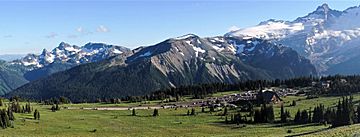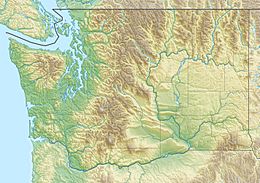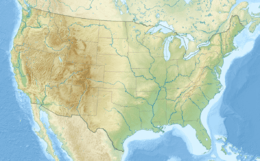Goat Island Mountain facts for kids
Quick facts for kids Goat Island Mountain |
|
|---|---|

Goat Island Mountain centered
(Sunrise lower right, Little Tahoma upper right, Cowlitz Chimneys and Banshee Peak to left} |
|
| Highest point | |
| Elevation | 7,288 ft (2,221 m) |
| Prominence | 888 ft (271 m) |
| Isolation | 2.51 mi (4.04 km) |
| Parent peak | Little Tahoma Peak (11,138 ft) |
| Geography | |
| Location | Mount Rainier National Park Pierce County, Washington, U.S. |
| Parent range | Cascades |
| Topo map | USGS Sunrise |
| Climbing | |
| Easiest route | class 2 scrambling |
Goat Island Mountain is a cool mountain that looks like a ridge. It's about 7,288 feet (2,221 meters) tall! You can find it in Mount Rainier National Park in Washington state. This mountain is part of the Cascade Range, a big chain of mountains.
Goat Island Mountain is about 5.76 miles (9.27 kilometers) east of the top of Mount Rainier. You can see it really well from the Sunrise Historic District and the trails around the Sunrise area. The Wonderland Trail is a path that can take you closer to this mountain. From the top, you get amazing views of places like Cowlitz Chimneys, Fryingpan Glacier, and Mount Rainier itself.
The mountain got its name because mountain goats were often seen there. The name was officially chosen in 1932. Water from Goat Island Mountain flows into the White River.
Weather at Goat Island Mountain
Goat Island Mountain is in a place with a "marine west coast" climate. This means it gets a lot of moisture from the Pacific Ocean. Most weather fronts, which are like big weather systems, come from the Pacific Ocean. They travel northeast towards the Cascade Mountains.
When these weather fronts hit the tall Cascade Mountains, they are forced to go up. This causes them to drop their moisture as rain or snowfall onto the mountains. Because of this, the west side of the Cascades gets a lot of rain and snow, especially in winter.
In winter, it's usually cloudy. But in summer, high-pressure systems over the Pacific Ocean often bring clear skies. The best time to visit or climb Goat Island Mountain is usually from July through September. This is when the weather is most pleasant for outdoor activities.
Images for kids
 | Selma Burke |
 | Pauline Powell Burns |
 | Frederick J. Brown |
 | Robert Blackburn |







